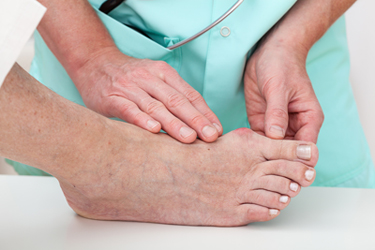 If you have a bump on the side of your big toe, there is a chance that you may have a bunion. It's common for the structure of the foot to change as a result of the big toe being pushed toward the other toes. This worsens misalignment in the toes, resulting in the bony protrusion developing. This progressive condition is commonly caused by a predisposed, inherited trait affecting the structure of the foot. Poor-fitting shoes do not cause bunions, although they may advance the progression of the disorder. Common symptoms may include experiencing numbness or a burning sensation, in addition to observing swelling and redness in the area. Some patients may notice calluses developing on the big toe, and movement may become restricted. A treatment option can include choosing the right shoes with enough room so the toes can be comfortable and move freely. Activities that irritate the bunion, such as standing for long periods of time, should be avoided. If you are experiencing pain from a bunion, a consultation with a podiatrist is advised.
If you have a bump on the side of your big toe, there is a chance that you may have a bunion. It's common for the structure of the foot to change as a result of the big toe being pushed toward the other toes. This worsens misalignment in the toes, resulting in the bony protrusion developing. This progressive condition is commonly caused by a predisposed, inherited trait affecting the structure of the foot. Poor-fitting shoes do not cause bunions, although they may advance the progression of the disorder. Common symptoms may include experiencing numbness or a burning sensation, in addition to observing swelling and redness in the area. Some patients may notice calluses developing on the big toe, and movement may become restricted. A treatment option can include choosing the right shoes with enough room so the toes can be comfortable and move freely. Activities that irritate the bunion, such as standing for long periods of time, should be avoided. If you are experiencing pain from a bunion, a consultation with a podiatrist is advised.
If you are suffering from bunions, contact one of our podiatrists of Jill Einhorn, DPM and James Einhorn, DPM. Our doctors can provide the care you need to keep you pain-free and on your feet.
What Is a Bunion?
A bunion is formed of swollen tissue or an enlargement of boney growth, usually located at the base joint of the toe that connects to the foot. The swelling occurs due to the bones in the big toe shifting inward, which impacts the other toes of the foot. This causes the area around the base of the big toe to become inflamed and painful.
Why Do Bunions Form?
Genetics – Susceptibility to bunions are often hereditary
Stress on the feet – Poorly fitted and uncomfortable footwear that places stress on feet, such as heels, can worsen existing bunions
How Are Bunions Diagnosed?
Doctors often perform two tests – blood tests and x-rays – when trying to diagnose bunions, especially in the early stages of development. Blood tests help determine if the foot pain is being caused by something else, such as arthritis, while x-rays provide a clear picture of your bone structure to your doctor.
How Are Bunions Treated?
If you have any questions, please feel free to contact our offices located in Brooklyn and Astoria, NY . We offer the newest diagnostic and treatment technologies for all your foot care needs.